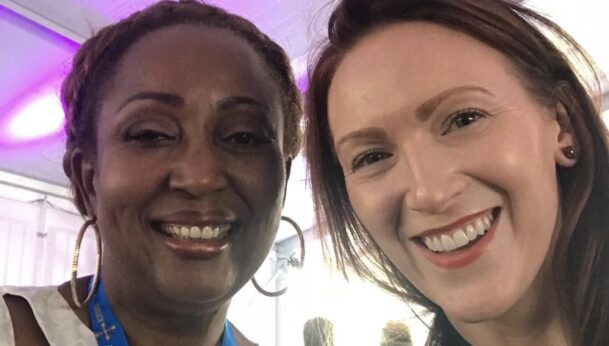Reflections from ICPD25 – Part 2
10.10.2022 Molly McGrath

Violence robs people of their human right to self determination and well-being, leaving physical, mental, and emotional scars, damage to short term and long term health, making the path to well being that much longer and more difficult. Lack of choice in family planning exacerbates and perpetuates other development challenges. Lack of access to resources beyond those needed for basic survival, like health and education, contributes to and maintains the vicious cycle of poverty.
With less than a decade before the Sustainable Development Goals (SDGs) are evaluated, ICPD focused on the “three zeros”: zero preventable maternal deaths, zero unmet needs for family planning and zero gender based violence.
A study was completed in advance of the conference showing that it would cost $264 billion to achieve this, with about $9 billion being formally committed by the end of the conference. This conference was unique in how inclusive it was. It involved over 8,000 people from more than 170 countries, many of them being the people who are on the ground completing this work. All attendees including states were invited to make formal commitments on how they would contribute to the three zeros.
These commitments are part of the conference organizers’ goal to build in accountability and momentum as well as develop a global framework from which all stakeholders could move forward. They stem from 12 commitments outlined in the “Nairobi Statement on ICPD25-Accelerating the Promise.” The UNFPA has also made the commitment to establish a high level commission to move the agenda forward that will pull from all stakeholders including government, private sector, civil society, activists, and philanthropists. Based on the commission’s recommendations, UNFPA will report on the progress being made toward the 12 commitments.
There Is No Limit Foundation’s commitment is our vision statement: to work toward a world free of poverty, inequality, and violence, where independent, networked individuals leverage their knowledge, skills and connections to uplift and provide for themselves, their families and communities. The Foundation has been conducting broad research on approaches to ending FGM/C across the globe including in practice, policy, prevention, programming and the impact of the COVID-19 pandemic. As the Foundation is focusing on how to continue to educate and protect vulnerable girls and women in The Republic Guinea given the impacts of COVID-19, we are proud to continue being a part of moving this agenda forward and will be releasing more information on our work and plans in the coming months.

With British Journalist, Isha Sesay.
Below are some of the recurring themes and topics discussed that I will be exploring further in my research and writing as we continue our Foundation’s work and as a global community, we evaluate progress towards achieving the SDGs by 2030.
-Implementation gap – how to turn our words into action, go from the what to the how, create strategy and action plans, complete the action – follow through and follow up, integrating lessons learned since Cairo in 1994
-Dynamics of power and origins/motivations for discrimation, transformation of power
-The process of changing norms through law, political will, advocacy, accountability, collaboration
-Long term commitment to implementation
-Best practices and scalability
-Communicating best practices from local to national to global and global to national to local
-Community conversations and grassroots work
-Rural vs urban differences and similarities in challenges and solutions
-Youth involvement from community planning to lawmaking to change movements
-Technology in communication, empowerment, connection, data gathering and distribution
-Men’s role in preventing FGM
-Data access and accuracy
-Economic empowerment and opportunities
-Addressing the financial incentives of FGM (our Co-Founder, Aissata M.B. Camara, has developing innovative approaches to address this, such as the concept of FGM Economics. The goal is to clearly research the financial side of FGM as a way of supporting abandonment efforts worldwide.)
-Health tools including technological advances in medicine and services delivery
-Sports role in empowerment, inclusion and equality
-Climate change’s disproportionate effect on women and the poor, especially in SRHR
-Access (to everything: hygiene products, information, education, security, sustenance, data, finance, opportunity, lawmakers, technology, one another)
-Financing required and do we know exactly what to do with the funds if raised it all today
-Communication/collaboration/coalition building and barriers to doing so
-Barriers to achieving three zeros such as growing opposition
In her closing remarks, Dr. Kanem, UNFPA Executive Director, said “We know what we have to do, we know what it will cost, and we know why we do it. We do it because women and girls matter.” She mentions the what, the cost, and the why, and many great conversations took place about how as well, including how local best practices can be scaled to how global strategies can be localized. The “implementation gap” was mentioned many times and I appreciate the fact it was not brushed over. This was not just a conference to provide energy to continue the work; it recognized and spoke candidly about the reality of the challenges. Taking strategy from ideas to reality is my forte and I look forward to seeing how I can contribute in this area.
In the next and final part of these reflections on the ICPD Nairobi Summit, I will share some personal experiences and focus on the power of change, the power of community and the power of these combined.